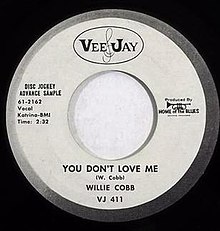
William James Dixon was an American blues musician, vocalist, songwriter, arranger and record producer. He was proficient in playing both the upright bass and the guitar, and sang with a distinctive voice, but he is perhaps best known as one of the most prolific songwriters of his time. Next to Muddy Waters, Dixon is recognized as the most influential person in shaping the post–World War II sound of the Chicago blues.

Muddy Waters (1913–1983) was an American blues artist who is considered a pioneer of the electric Chicago blues and a major influence on the development of blues and rock music. He popularized several early Delta blues songs, such as "Rollin' and Tumblin'", "Walkin' Blues", and "Baby, Please Don't Go", and recorded songs that went on to become blues standards, including "Hoochie Coochie Man", "Mannish Boy", and "Got My Mojo Working". During his recording career from 1941 to 1981, he recorded primarily for two record companies, Aristocrat/Chess and Blue Sky; they issued 62 singles and 13 studio albums.

"I Wish You Would" is a song recorded by Chicago blues musician Billy Boy Arnold in 1955. It was developed while Arnold was performing with Bo Diddley and incorporates a Diddley-style rhythm. Called "a timeless Chicago blues classic", "I Wish You Would" is Arnold's best-known song and has been recorded by several artists, including the Yardbirds, who recorded it for their debut single in 1964.

"Baby, Please Don't Go" is a traditional blues song that was popularized by Delta blues musician Big Joe Williams in 1935. Many cover versions followed, leading to its description as "one of the most played, arranged, and rearranged pieces in blues history" by French music historian Gérard Herzhaft.
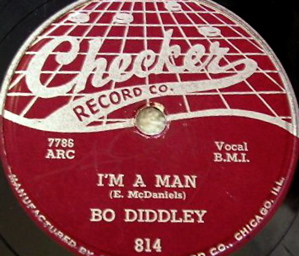
"I'm a Man" is a rhythm and blues song written and recorded by Bo Diddley in 1955. Inspired by an earlier blues song, it was one of his first hits. "I'm a Man" has been recorded by a variety of artists, including the Yardbirds, who adapted it in an upbeat rock style.

"Trouble No More" is an upbeat blues song first recorded by Muddy Waters in 1955. It is a variation on "Someday Baby Blues", recorded by Sleepy John Estes in 1935. The Allman Brothers Band recorded both studio and live versions of the song in the late 1960s and 1970s.
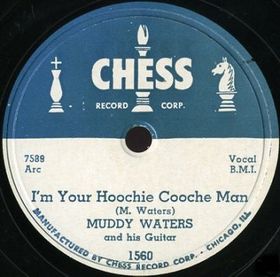
"Hoochie Coochie Man" is a blues standard written by Willie Dixon and first recorded by Muddy Waters in 1954. The song makes reference to hoodoo folk magic elements and makes novel use of a stop-time musical arrangement. It became one of Waters' most popular and identifiable songs and helped secure Dixon's role as Chess Records' chief songwriter.

Black Magic is a studio album by Chicago blues musician Magic Sam. Delmark Records released it under the name of "Magic Sam Blues Band" in November 1969, shortly before his death. The album was a follow-up to Magic Sam's highly influential studio debut, West Side Soul (1968), and also includes a mix of originals with songs written by his contemporaries.
"Wang Dang Doodle" is a blues song written by Willie Dixon. Music critic Mike Rowe calls it a party song in an urban style with its massive, rolling, exciting beat. It was first recorded by Howlin' Wolf in 1960 and released by Chess Records in 1961. In 1965, Dixon and Leonard Chess persuaded Koko Taylor to record it for Checker Records, a Chess subsidiary. Taylor's rendition quickly became a hit, reaching number thirteen on the Billboard R&B chart and number 58 on the pop chart. "Wang Dang Doodle" became a blues standard and has been recorded by various artists. Taylor's version was added to the United States National Recording Registry in 2023.

Go Bo Diddley is the second album by American rock and roll musician Bo Diddley, released in July 1959. The album was Bo's first studio album that included some material that hadn't been prereleased on singles, and his first LP for Checker Records. In 2003, Rolling Stone ranked it number 214 on its The 500 Greatest Albums of All Time, and 216 in a 2012 revised list.

"Who Do You Love?" is a song written by American rock and roll pioneer Bo Diddley. Recorded in 1956, it is one of his most popular and enduring works. The song represents one of Bo Diddley's strongest lyrical efforts and uses a combination of hoodoo-type imagery and boasting. It is an upbeat rocker, but the original did not use the signature Bo Diddley beat rhythm.
"One Way Out" is a blues song that was recorded in the early 1960s by both Sonny Boy Williamson II and Elmore James. A reworking of the song by G. L. Crockett, titled "It's a Man Down Here", appeared on the Billboard record charts in 1965. In 1971, the Allman Brothers Band recorded an updated live version of the song, which was included on their popular Eat a Peach album (1972).
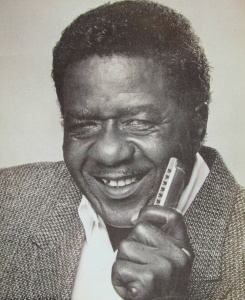
Willie C. Cobbs was an American blues singer, harmonica player and songwriter. He is best known for his song "You Don't Love Me".

"You Don't Love Me " is a song by Jamaican recording artist Dawn Penn, released in February 1994 by Big Beat as the first single from her first studio album, No, No, No (1994). The song's lyrics are credited to Penn, Bo Diddley and Willie Cobbs, and production was handled by Steely & Clevie.

"Baby What You Want Me to Do" is a blues song that was written and recorded by Jimmy Reed in 1959. It was a record chart hit for Reed and, as with several of his songs, it has appeal across popular music genres, with numerous recordings by a variety of musical artists.
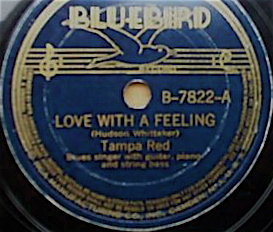
"You've Got to Love Her with a Feeling", or "Love with a Feeling" as it was originally titled, is a blues song first recorded by Tampa Red in 1938. Numerous blues artists have interpreted and recorded the song, making it a blues standard. When Freddie King adapted it in 1961, it became his first single to appear in the record charts.
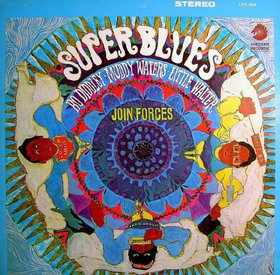
Super Blues is a 1967 studio album by a blues supergroup consisting of Bo Diddley, Muddy Waters, and Little Walter. The album was released in both mono and stereo formats by Checker Records in June 1967. A follow-up album The Super Super Blues Band was released later that year and featured Howlin' Wolf replacing Little Walter.

"You Can't Judge a Book by the Cover" is a 1962 song by rock and roll pioneer Bo Diddley. Written by Willie Dixon, the song was one of Diddley's last record chart hits. Unlike many of his well-known songs, "You Can't Judge a Book by the Cover" does not rely on the Bo Diddley beat. A variety of rock and other performers have recorded renditions of the song.
"Hate to See You Go" is a blues song written and recorded by Chicago blues artist Little Walter. In 1955, Checker Records released it as one of three singles by Walter that year. The song, a one chord modal blues, is a reworking of "You Don't Love Me", written by Bo Diddley and recorded one month prior.
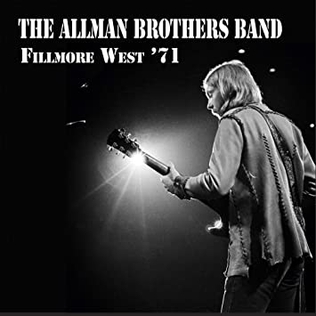
Fillmore West '71 is a four-CD live album by the Allman Brothers Band. It was recorded January 29 – January 31, 1971, at the Fillmore West in San Francisco. It was released on September 6, 2019.
